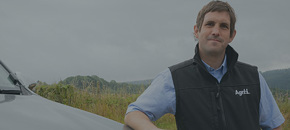Supporting Each Other in our Farming Community
In this episode we're discussing mental health in the farming industry. Whether you're a farmer, grower, farm worker, or involved in the ancillary industry, mental health can affect any of us.
Today, we’re joined by Stephanie Berkeley from the Farm Safety Foundation and Alex Phillimore from the Farming Community Network.
Let’s talk about the unique mental health challenges in farming and what we can do to make a difference.
This Episode Features:

Tony Smith
Your Tramlines Host

Stephanie Berkeley
Farm Safety Foundation

Alex Phillimore
Farming Community Network
Mental Health in the Farming Industry
Where are we at with mental health awareness in our industry?
Stephanie Berkeley: I’d say the industry has come a long way in the past ten years. A decade ago, mental health wasn’t even a talking point, and farm safety wasn’t either. But now, farmers are increasingly aware of their own mental health and that of the people around them.
Our research shows 95% of young farmers believe mental health is one of the biggest hidden dangers in the industry. So, while it’s great that awareness has increased, it’s concerning that it remains such a significant issue.
From the Farming Community Network’s perspective, is our awareness of mental health improving?
Alex Phillimore: Definitely. We’re having more open conversations around mental health now. It’s hard to say whether mental health in the industry is improving or declining, but the willingness to talk is there. I’ve noticed that at events, people are now more likely to approach our charity stands and have discussions. I’ve also seen a big shift in organisations reaching out to us to provide talks and training on mental health, which is really encouraging.
The Shift in Mental Health Conversations
Does this increase in conversations signal positive change?
Stephanie Berkeley: Absolutely. Alex made a good point about the shift in attitudes.
I had a farmer once tell me after a session, “If you’d told me this was about mental health, I wouldn’t have come. But I’m glad I did.”
There’s still a misconception that mental health equals poor mental health, but it’s something we all have. It’s about recognising when things aren’t quite right and knowing what to do about it, just like with our physical health.
When our mental health isn’t in a good place, what does that look like?
Stephanie Berkeley: It looks different for everyone. Some might have trouble concentrating, difficulty sleeping, or they may withdraw from social interactions.
For others, it’s more about masking their struggles, becoming overly social, or drinking more. Recognising your own signs is key, as well as knowing positive coping mechanisms.
The Impact of Mental Health on Farming
How does poor mental health impact a farmer’s day-to-day life?
Alex Phillimore: It can make you feel stuck, with the farm becoming your entire world. If you’re in a negative headspace, everything can start to feel overwhelming. Social media can sometimes exacerbate that, as it often feeds into negative thinking patterns.
Loneliness vs. Isolation in Farming
We hear a lot about loneliness and isolation in farming. What’s the difference?
Stephanie Berkeley: Loneliness is about feeling disconnected, even if you’re around others. Many farmers work long hours alone, often 14-16 hours a day without seeing another person.
What might start as a small concern in the morning can snowball into something much larger by the end of the day because there’s no one to talk to.
Isolation in farming is common, but loneliness is something else. It’s one of the signs of poor mental health—when someone distances themselves from people who know them well.
The Connection Between Mental Health and Farm Safety
How does mental health affect farm safety?
Stephanie Berkeley: Poor mental health can result in sleep deprivation, lack of concentration, and burnout—all of which can have dangerous consequences on a farm. For instance, if you're tired and unfocused behind the wheel of a tractor, you're more of a danger than the machinery itself.
Our research last year showed that farmers with lower mental wellbeing are more likely to take risks, less likely to wear safety gear, and less likely to consider farm safety their personal responsibility. There’s a direct link between mental health and farm safety.
Mental Health Support for Farmers
Can you tell us more about the support offered by the Farming Community Network?
Alex Phillimore: We have around 400 volunteers across England and Wales, offering support to farmers through difficult times. Our volunteers often come from farming backgrounds and provide practical and emotional support.
We work with individuals, helping them find a positive way forward, whether the issue is personal, business-related, or a mix of both.
It’s important to remember that there are many organisations, like FCN, Yellow Wellies, and others, that provide support. The key is to reach out, no matter which organisation you go to.
Generational Differences in Attitudes Towards Mental Health
Do you notice any generational differences in how farmers approach mental health?
Alex Phillimore: I do. Younger farmers, especially those involved in Young Farmers Clubs and agricultural colleges, are generally more open about mental health.
However, some older generations can still be resistant. I spoke to a young farmer recently who said that when he talks to his dad about his feelings, he’s dismissed as a “snowflake” and told to get back to work. So, while younger generations are more open, there’s still some resistance from older farmers.
Stephanie Berkeley: It’s everyone’s responsibility to change these attitudes. We don’t all need to be experts in mental health, but we can all show that we care. If you’re worried about someone but don’t feel comfortable talking to them directly, pass it on to someone who might.
Conclusion and Final Tips
What are your top tips for listeners?
Alex Phillimore: My practical tip is simple — talk. Open up, and if you're struggling, reach out. There’s always support available.
Stephanie Berkeley: I agree. Everyone in agriculture, whether directly farming or in related industries, is affected by these challenges. It’s important to recognise that and take action when needed.
Additional Information
We are donating £1 for every download of this podcast to support the ongoing tribute to Leonard Eadon 1999 – 2022.
Visit leneadon.muchloved.com to make a separate donation or keep informed of events to support mental health awareness for the rural community.
Related episodes
Exploring Inclusivity and Opportunities with Young Farmers Clubs
Episode 10Re-think your Risk for Farm Safety Week
Wellies, Work and Wellbeing
Why There is More to Farming than Wellies
Episode 19Coping with Loneliness and Isolation in Farming
Episode 9Farming With Pride
Episode 17Tramlines 2023 Wrapped: Key Podcast Takeaways for 2024
Check Your Bits and Bobs
Episode 21Seeds of Change: The Power of Diversity in Farming
Episode 20Never miss an episode of Tramlines








